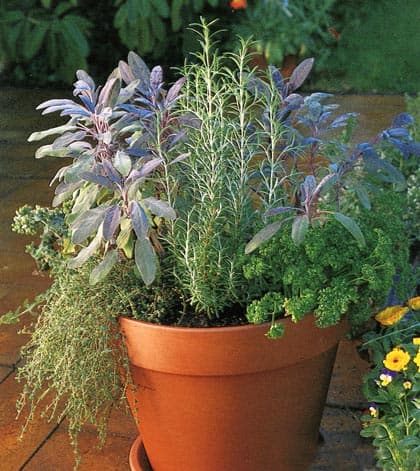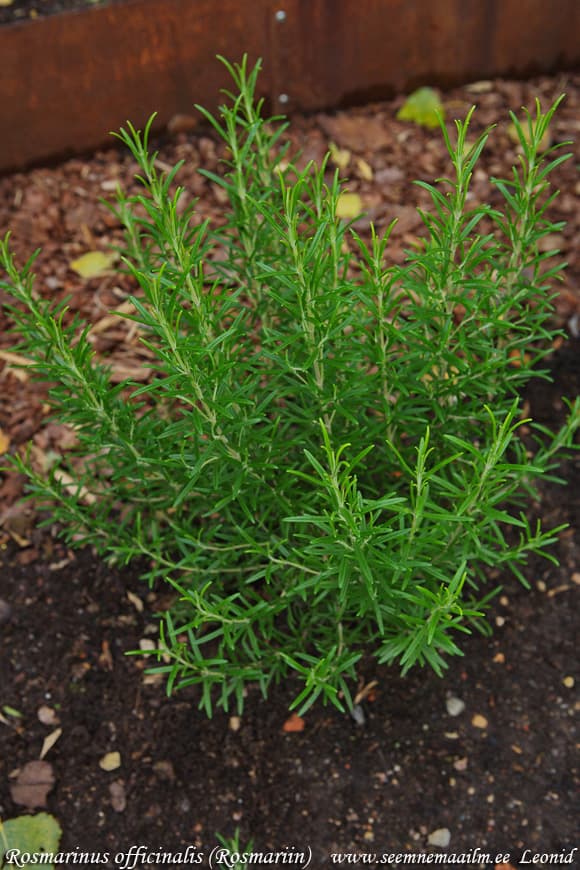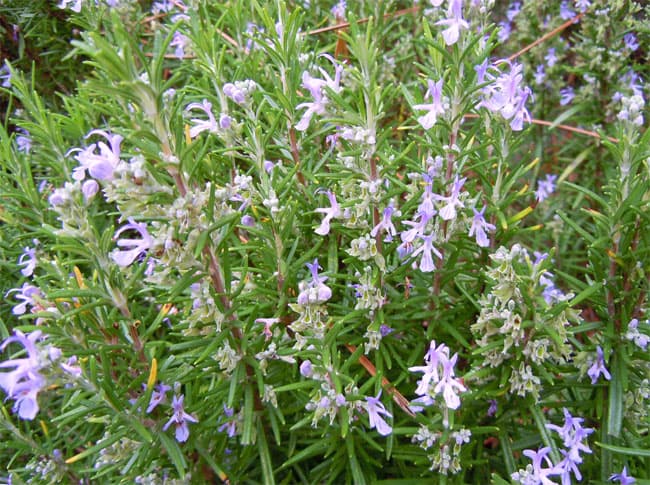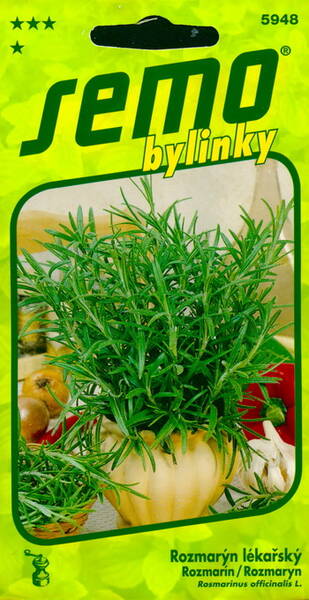The legendary plant, sung in myths, is a great find for creating a southern accent in your garden.
Plants are about 1-1.5 m high. The leaves are numerous, opposite, leathery above, and pubescent below. The flowers are small and collected in dense purple inflorescences. Blooms in spring. In the conditions of Estonia in the open ground in summer they are used in container culture (with wintering in a cool, bright room at above zero temperatures).
Agricultural technology.
The plant prefers sunny places and limed, well-drained soils. Seeds are sown in February-March in boxes with light soil, covered with a layer of earth 0.3-0.4 cm. At a temperature of +12..+22 °C, shoots appear in a month. Seedlings are picked one by one into pots.

Flowers: Summer
Height: 4 feet
Hardiness Rating: 8 9 10
Its powerful fragrance goes well with lamb and chicken. Add tomato soup, stews and, finely chopped, freshly cooked peas. The tea is said to help with headaches, colic and colds.
Sowing Instructions: Sow from late winter to early summer in John Innes Seed Compost. Do not cover the seed with compost. Make sure that the compost is moist but not wet and seal it in a polythene bag until after germination which usually takes 12-40 days at +16°C.
Growing Instructions: Transplant when large enough to handle into 8 cm pots. Later plant out 60 cm apart into well-drained soil in a sunny sheltered site.

* Externally, a rosemary sprig resembles a spruce branch with many small leaves that look like flat needles. While they are fresh, they are soft, and when they dry out, they become prickly like spruce needles.
Rosemary leaves are two percent essential oils, which are an excellent sedative, as they improve mood and help to calm down and relax. It is no coincidence that a few drops of rosemary are added when taking baths, which also has a therapeutic effect.
In addition, it helps improve memory, so rosemary is prescribed to students, which helps during the session and exams, as well as to schoolchildren during the school year.
Rosemary has antibacterial properties, has a beneficial effect on the body during colds. Its volatile substances disinfect the air, get rid of streptococcus, staphylococcus, yeast fungi, E. coli. Dry flowers or sprigs of rosemary can be placed in a sachet and hung in the room. It will exude a pleasant aroma for several months.
The aroma emanating from rosemary is similar to the smell of pine. It is very rich, pronounced, with a predominance of sweet notes.
The taste of rosemary is spicy and pungent, so it is not surprising that it is very loved by fans of spicy food and smells. Rosemary has found a very wide application in folk medicine: it helps with various disorders of the nervous system, as well as with diseases of the gastrointestinal tract. A useful infusion is prepared from rosemary leaves, which is recommended for asthma, as well as for various diseases of the upper respiratory tract. For inflammatory diseases of the throat, this infusion should be used for gargling.
In cooking, young rosemary leaves are used as a spice, collected from the upper third of the branches of the plant and dried (most often, rosemary is used in crushed form).
Rosemary is added to second and first courses, vegetable stews, salads, appetizers and side dishes, pates and minced meat as a classic spice - this piquant spice goes well with lamb, pork, poultry and rabbit (rosemary gives them an appetizing aroma of game).
Vegetables with rosemary acquire a light and subtle aroma. In restaurants, potatoes are often cooked with this spice: baked, fried, stewed.
Rosemary is also used as a flavoring agent for oils and salt, it is included in the composition of complex spices for meat.
It is not recommended to use rosemary together with bay leaf.
Rosemary is completely inappropriate in fish dishes, since the thick camphor note of the spice "interrupts" the smell of fish and becomes dominant, as a result, the taste of the finished dish acquires a noticeable flavor of medicinal herbs.
Remember that rosemary is one of the strongest spicy seasonings, so you should not abuse it.
Attention!
Rosemary is contraindicated for pregnant women, since it has an abortive effect. It is also not recommended for patients with hypertension, since it contributes to high blood pressure and for people prone to convulsions. If the oil of this plant gets on the skin, a burning sensation and even a feeling of dizziness are very likely (this applies to people with increased skin sensitivity).

Rosemary, dew of the sea. Pharm.: folia anthos, folia roris marini.
Recipe: A small amount of dried rosemary leaves is mixed with parsley and ground with butter.
The resulting paste is placed in small portions inside the carcass of a chicken, turkey, duck, or goose, salt is added, and then baked in the oven until done.
* Rosemary has been a popular essential oil plant since ancient times; the Greeks dedicated it to the goddess Venus. It was believed that the lovely rosemary makes a person cheerful and happy, relieves bad dreams, and preserves youth. It has long been a favorite spice in Mediterranean countries.
Rosemary grows wild in Southern Europe. In warm climates, it grows in open ground in one place for up to 20 years, reaching a height of 2 meters. Tall rosemary bushes are often grown as hedges, while creeping forms are used in rock gardens.
Rosemary (Rosmarinus) is a hardy, evergreen, frost-sensitive shrub of the Lamiaceae family with small, leathery leaves and racemose inflorescences of blue, white, or pink flowers. An essential oil used in perfumery and medicine is extracted from the fragrant, needle-shaped leaves and flowering shoots of rosemary. The flowers and leaves are also used as a culinary spice (infused in wine and vinegar, as a seasoning for salads and fish, for making sauces, etc.), for baths, and as an insecticide (as a moth repellent). In folk medicine, rosemary is a good remedy for indigestion and headaches, heart weakness, liver disease, and metabolic disorders; it stimulates blood circulation.
Sun-loving and heat-loving rosemary is easy to grow, but it dislikes sudden temperature fluctuations and stagnant water from overwatering, causing it to shed its leaves. For the summer, it's best to transplant rosemary from its pot into the garden (to a sunny, warm spot sheltered from the wind) or place it on a sunny balcony to maintain its essential oil content. In hot weather, rosemary requires ample watering; if it lacks moisture, its lower leaves will turn yellow. During the flowering period, young, densely hairy shoots with leaves and flowers are cut from the rosemary, using them for processing and drying. In spring, fall, and winter, keep rosemary on a bright windowsill in a cool room (a cool, crisp winter temperature of 5-15 degrees Celsius ensures a compact bush and abundant flowering); water regularly and moderately.
Rosemary bushes are pruned in the spring to promote good tillering, leaving 3-4 internodes of the previous year's growth. If mature rosemary stems become bare, rejuvenation pruning is performed in February-March (usually every 7 years), cutting shoots at the ground level. Large rosemary bushes can overwinter in a cool greenhouse or hothouse, a dry cellar, or a basement.
If rosemary isn't planted in the garden for the summer, repot it into fresh soil in early spring if necessary. Repotting is typically done every two years, but if the root system is dense, it can be done annually. Repot rosemary into a slightly larger pot with good drainage and fertile, humus-rich, loose soil. During the active growing season from March to September, feed rosemary with mineral and organic fertilizers; it thrives on calcium.
Rosemary is propagated by cuttings, division, layering, and seeds. Rosemary cuttings, taken in summer from one-year-old shoots 10 cm long, are planted halfway into the substrate and mulched with humus; they root easily. Rosemary seeds are sown in February-March; the seedlings bloom in the second year.
Rosemary is successfully used in bonsai trees, as it can easily be shaped into dense trees. The presence of fragrant rosemary in the home is believed to have a beneficial effect on unstable individuals, pregnant women, and children, and to alleviate anxiety, insomnia, and fatigue.















